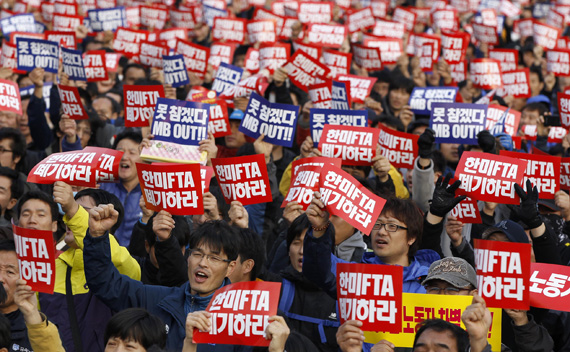The KORUS-FTA Ratification Stalemate: Implications for Korea’s Election 2012
More on:

South Korean president Lee Myung-bak showed admirable patience in the months he waited for the U.S. Congress to ratify the Korea-U.S. Free Trade Agreement and two other trade pacts on October 12. In the end, his visit to Washington was the action forcing event that broke the congressional stalemate. But the political ground in Seoul has shifted in recent months as represented by the outcome of October 26th Seoul mayoral bi-election, is posing new obstacles to Korean National Assembly ratification. In the first of a series of essays examining South Korean public opinion and implications for issues in U.S.-Korea relations, Kim Chi-wook analyzes the implications of this shift in South Korean public opinion from policies that emphasize growth to those that emphasize distribution.
In the weeks following the mayoral election, South Korea’s opposition party has dug in its heels in opposition to ratification of the agreement, focusing its attention on an Investor-State Dispute (ISD) resolution provision that has been standard in other FTAs, but is being portrayed by the opposition as a sovereignty giveaway. President Lee has pledged that he will ask the United States to reopen negotiations on the provision if the ROK National Assembly ratifies the FTA. This surprising offer might seem magnanimous, given that the ruling party has the votes to pass the provision, or cynical, since it would be unusual for the United States to welcome renegotiation of a pact following ratification by both legislatures. Whether or not this move breaks the deadlock and the FTA passes, Kim Chi-wook’s analysis of the current debate suggests that social policy and welfare issues will be important factors in South Korea’s 2012 parliamentary and presidential elections.
More on:
 Online Store
Online Store
